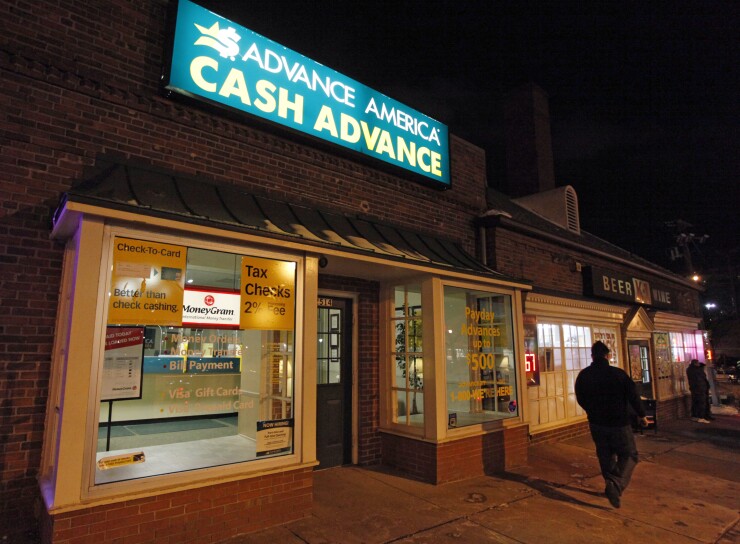WASHINGTON — Banks could get an official breather from Operation Choke Point as early as next week.
U.S. District Judge Gladys Kessler is set to rule on whether to halt the controversial policy, in which the Justice Department and federal regulators allegedly pressured banks to cut off ties with certain targeted industries, including payday lenders.
At issue is a case brought by the Spartanburg, S.C.-based payday loan chain Advance America, which is asking for a temporary injunction of Choke Point, claiming it has caused it to lose numerous banking relationships and cut into its profits.
“We have a date with the guillotine on March 31,” said Advance America attorney David Thompson, referring to U.S. Bank’s decision to end a 14-year banking relationship with Advance America that will affect about 1,260 of its stores.

As a direct result of pressure from regulators, the lawyer said, the company lost 21 banking relationships and struggled to find new partners. Those difficulties are industrywide, Thompson claimed. “They have to have armored cars. They have to carry a huge amount of cash” from place to place. “The huge expenses of this will put this industry out of business.”
But in a court hearing Thursday, the judge challenged that argument. Thompson said that the Federal Deposit Insurance Corp. had sought to depict payday lenders as unsavory by putting them in the same category as pornographers in a controversial list of potentially high-risk areas that the agency circulated as part of a financial institution letter. That list was later rescinded by the agency after complaints from lawmakers and affected industries.
“It was a deliberate smear campaign,” Thompson said.
But Kessler responded that the government had not sought to damage payday lenders’ reputation publicly, through the media or other means. She noted that the list was sent only to financial institutions.
“It can’t be a smear if no one knows about it,” she said.
Thompson also argued that Advance America had suffered $125 million in losses in 2016, though he acknowledged that included goodwill provisions. But the lawyers who represented the FDIC argued that did not prove those losses had been caused by Choke Point, which was first announced by the Justice Department in 2013.
“If there were a campaign against them,” said Duncan Stevens, a counsel at the FDIC, "the harm would have likely materialized in 2013 and 2014 and 2015.”
Other defendants in the case are the Federal Reserve and the Office of the Comptroller of the Currency. Federal regulators have argued that they were not willingly a part of Operation Choke Point, though the Justice Department did use information from the agencies as part of its program.
During the hearing, Stevens also argued that Advance America would have to prove that the company itself had been targeted, not just the industry as a whole.
“There are many reasons why banks may not want to have a relationship with payday lenders,” he said, citing the cost of anti-money-laundering monitoring as well as reputational risk. “Banks have terminated relationships based on general conclusions about the payday lending industry.”
The FDIC warned that if the judge granted an injunction, even temporarily, regulators could lose their authority to supervise banks for safety and soundness.
“Even in an instance when a bank that was involved with an entity that was committing illegal actions, this injunction would prevent” the FDIC from intervening, Stevens said. “It muzzles the regulators.”





